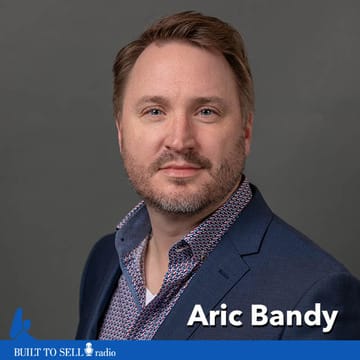About this episode
Back in 2007, Aric Bandy saw Google investing heavily to compete with Amazon Web Services (AWS) and so decided to pivot his company, Agosto. Instead of offering general IT consulting, Bandy focused on helping clients move their businesses online using something Alphabet calls the Google Cloud Platform.
The move to tie his company so tightly to a juggernaut caught the attention of a global systems integrator, which made a play to acquire Agosto. The deal fell apart, but the process caused Bandy to realize he had some flaws in his model. Instead of mourning the loss of the acquisition deal, he started building his company to sell.
In this episode of Built to Sell Radio, Bandy describes the changes they made to make Agosto more attractive to an acquirer. It worked, as he successfully sold Agosto in April 2020 to one of the leading private equity groups in the cloud services arena.
The transformation of Agosto into a sellable company gives you a unique window into what acquirers look for in the companies they buy. Bandy shares a lot of his wisdom here, including:
- Why hitting $10 million in annual revenue is an essential benchmark for your valuation
- How to calculate the rule of 40
- The difference between what a financial and strategic acquirer value (Bandy had offers from both)
- How retroactive modeling ensures a growth-oriented business doesn’t get unfairly discounted for lack of profit
- How to eliminate your personal guarantee with your bank
- The surprising role a cash forecast plays in helping an acquirer value your company
- Why it might be worth investing in audited financial statements this year
- A definition for “assignability” and why you need it in your customer contracts
- The best advice Bandy was ever given about selling a company
Bandy described the emotional weight that has been lifted from his shoulders now that his net worth is not so dependent on his operating business. Considering your financial position is one of four things you need to do to get emotionally ready to sell your business. Evaluate your readiness on all four factors by getting your PREScore™.
Check out our article on How Acquirers Evaluate Your Business Like An NFL Scout Picks Players.
And The Acquisition Entrepreneur too.

About Our Guest
Aric Bandy is a serial entrepreneur with a history of building valuable companies. In his present role as EVP of Corporate Development, Aric focuses on the growth strategy for Pythian.
Prior to Pythian, Aric led Agosto, an award-winning Google Cloud Premier Partner, which was acquired by Mill Point Capital and Pythian in 2020. During his tenure at Agosto, he packaged and sold off the Agosto MSP business in 2014. Before Agosto, Aric became the Vice President of Techies, the commercial spinout of Geek Squad, when Techies purchased Aric’s MSP start-up.
Outside of his work role, he’s been an adjunct faculty member at the University of Minnesota teaching a course on leveraging cloud-based apps to advance global health research. Aric holds a bachelor’s degree in marketing management from the University of St. Thomas.
Aric is a father of two, a guitar player, and can often be found outdoors with his boxer/husky rescue dog.


